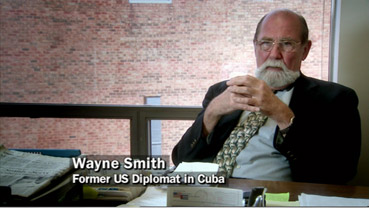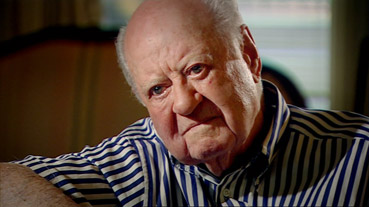| |
And in the Bay of Pigs in 1961,
Havana fought the playboy in the Cuban sun,
For Castro is a colour,
Is a redder than red,
Those Washington bullets want Castro dead.
For Castro is the colour...
...That will earn you a spray of lead. |
|
Washington
Bullets – The Clash |
Way
back in the early 1960s, long before the likes of Saddam
Hussein and the Taliban made themselves available, one of
America's principal bogeymen was Cuba's famously big-bearded
president, Fidel Castro. Swept to power at the head of a
popular revolution, Castro initially delighted much of the
Cuban populace by introducing a programme of government funded
education and health care for all, but seriously pissed
off the American big businesses stationed in Cuba by seizing
their property and assets for the state. As the name Castro
became associated with that ultimate in western scare words,
Communism, the American government and its propaganda-fed
populace became increasingly concerned by this pocket of
revolutionary Marxism sitting on their very doorstep. As
a result, a series of American administrations decided,
in that particularly undemocratic way that they sometimes operate,
that it would be in their best interests if Castro were to die
and that they would do all they could to quietly accelerate
the process.
They
had as their allies a sizeable community of largely Miami-based
Cuban exiles, those who had fled their homeland and harboured
a particular hatred for Castro. Acting individually, in
small groups, or as in the disastrous 1961 Bay of Pigs
debacle as a counter-revolutionary army, the often covertly
funded ex-patriots repeatedly tried to murder the revolutionary
leader. The 638 of the title is no randomly selected figure,
but the number of assassination plots uncovered and recorded
in detail by Fabian Escalante, ex-head of the Cuban intelligence
service. And yet Fidel Castro, now 81 years old, in imperfect
health and not as popular as he once was with his own people, is still alive and still president of Cuba. The
most powerful nation on earth, aided by a community of fiercely
determined men, have not been able to touch him.

Dollan
Cannell's fascinating documentary investigates this still
ongoing campaign to kill Castro and the various suggested
reasons for it's repeated failure. The approach is initially
playful, with almost mischievously sleight-of-hand editing
blending news footage with feature film extracts – notably
Mikheil Kalatozishvili's ground breaking I Am Cuba – making a seemingly successful bullet hit out of a simple tumble,
only to then back up and give purpose to this cinematic deception.
The seemingly jocular approach may seem at odds with the
subject matter, but is nonetheless in keeping with the desperate
absurdity of some of the methods devised and employed by
the would-be assassins. These included plans to make Castro's
beard fall out, to provide him with a poisoned diving suit,
to leave an exploding sea-shell for him to pick up, to substitute
his beloved cigars for ones that explode, and – my
personal favourite – to flood a TV station with LSD in the hope of making him freak out during
a live broadcast.
There
were, of course, a number of more seriously thought-out
attempts, some of which came remarkably close to succeeding.
Where the film really scores is in its interviews with
a number of those directly involved in assassination plots,
whose only regret even after all this time appears to be
that they failed to kill their target. The deeper Cannell gets into this territory,
the more troubling the connections and insinuations become.
This is especially true of Orlando Bosch, whose unsavoury
activities and almost certain involvement in the bombing
of a civilian plane did not stop the Republican Party from making
the campaign for his release from jail part of their election
drive. That Cannell actually lands an interview with Bosch
is astonishing enough, but the interview itself is... well,
that's best left for the film itself to reveal.
Little
attempt is made to explain just why the Miami Cubans harbour
such a hatred of El Presidente and it's thus left to us to find
our own answers, but in all other respects 638 Ways
to Kill Castro is a well researched, entertaining
and ultimately disturbing dip into the darker side of unofficial
American foreign policy. It can't help but suggest a blatant
hypocrisy at the heart of the Bush government's so-called
War on Terror, with former US diplomat in Cuba Wayne Smith
pointing out that George W. Bush's claim that anyone who
harbours a terrorist is also a terrorist is at odds with
his willingness to provide a safe haven for some of those
responsible for the attack on the Cabana 455 passenger flight.
It's also the very affable Smith who offers the most telling
assessment of the attitude of successive US governments
to Castro's Cuba when he says "Cuba seems to have the
same effect on American administrations that the full moon
had on werewolves."
Framed
1.78:1 and anamorphically enhanced, the film includes a
wide variety of archive footage whose original condition
is not always ideal, but if you're going to judge a transfer
then you need to do it on the basis of the newly shot material,
and that looks fine, with colour, contrast and detail all
of a high standard. The extracts from I am Cuba
are a little less polished than you might expect, but it's
doubtful the filmmakers had access to a digitally remastered
and restored source. The interviews that comprise the extra
features are of a similar standard to the main feature.

638
Ways to Kill Castro is a made for TV documentary
so is not designed to give the surrounds and subwoofer a
workout. Clarity is key, and here the soundtrack does its
job well. Music also sounds fine. Dolby 2.0 stereo is the
only track on offer here.
Interview
with Dollan Cannell, Director (27:11)
A really interesting interview with the gently spoken English
director, who covers a lot of worthwhile ground in enthralling
detail, providing answers to the sort of questions you'd
probably ask if you had the chance to talk to him about
the film. This includes the authenticity of the information
used, the role of the CIA, some material that did not make
it to the final cut and, of course, his unsuccessful attempt
to secure an interview with Castro himself.
The
rest of the extra features are all interviews that did not
make it into the final edit. Both sides of the debate over
Castro are represented and make for fascinating comparative
listening, particularly regarding the whole question of
just how you define a terrorist. All of the interviews,
including the one detailed above, are conducted in English
and have optional English subtitles.
Ex-president
Jimmy Carter (12:28)
Carter looks back at his own approach to dealing with Castro
and the policies that followed in his wake. He is not, as
you might imagine, a big fan of George Bush.
A
Miami Detective on the Bombing of Cabana 455
(8:05)
An interview with a Miami detective whose identity has been
concealed (not as well as you might expect – there are a
few very clear shots of his face) and whose testimony, if true,
provides further damning details of the plane bombing covered
in the main feature.
Ricardo
Alarcon, President of the Cuban National Assembly
(3:33)
Alarcon takes specific aim at the Bush government, the hypocrisy
surrounding the War on Terror, and the protection extended
in the US for Luis Posada Carriles, a man who has openly
admitted to terrorist acts against the Cuban people.
Ileana
Ros-Lehtinen, Congresswoman (1:21)
Ros-Lehtinen beams at the idea of seeing Castro killed and
refers to those involved in plots to do so as "freedom
fighters," recalling that old phrase about "One
man's terrorist..."
Tom
Parrott, Ex-CIA (8:07)
Secretary for a secret American policy group on Cuba in
the 1960s, Parrott engagingly explains the workings and
purpose of the group, including some of the more outlandish
plots made against Castro, most of which appear to have
been the brainchild of Chief of Operations Ed Lansdale.
He also discusses working with a particularly aggravated
Bobby Kennedy.
Richard
Goodwin, Aide to President John F. Kennedy
(3:59)
Following a quick tour of Kennedy photos on his wall, Goodwin
reveals Kennedy's fondness for James Bond novels, and shares
what little he admits to knowing about how the President
felt about "the Castro problem."
Otto
Reich, a Cuban American politician, Ex-State Department
(6:32)
Reich sincerely sings the praises of George W. Bush, whom
he regards as a friend, and believes that Castro's assassination
would be morally justified, making indirect comparisons
to Adolf Hitler and accusing Castro of being a terrorist
and supporter of international terrorism. Intriguingly,
some of his arguments are used elsewhere on this very DVD
by others to accuse George Bush of the very same.
Those
in the know will have picked up that this is a co-production
with Channel Four and that a TV screening date is thus probably
not far off. But Fremantle's DVD release still represents
a worthwhile purchase, for the transfer, for the extra features,
and of course for the film itself, which is as witty as
it is insightful, and deserves a place on the shelf of anyone
with an interest in the increasingly dishonest, underhand
and unpleasant nature of international politics.
|